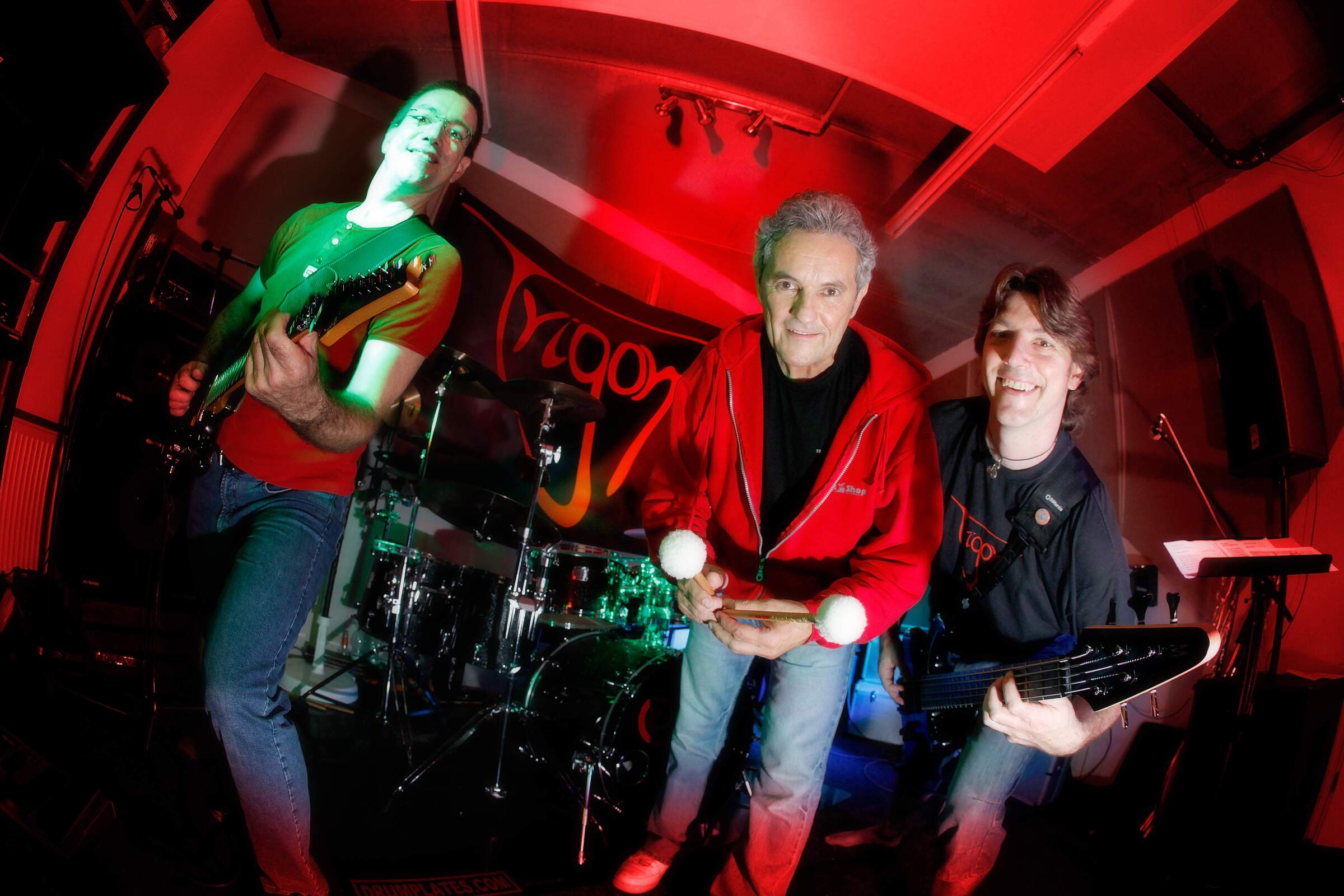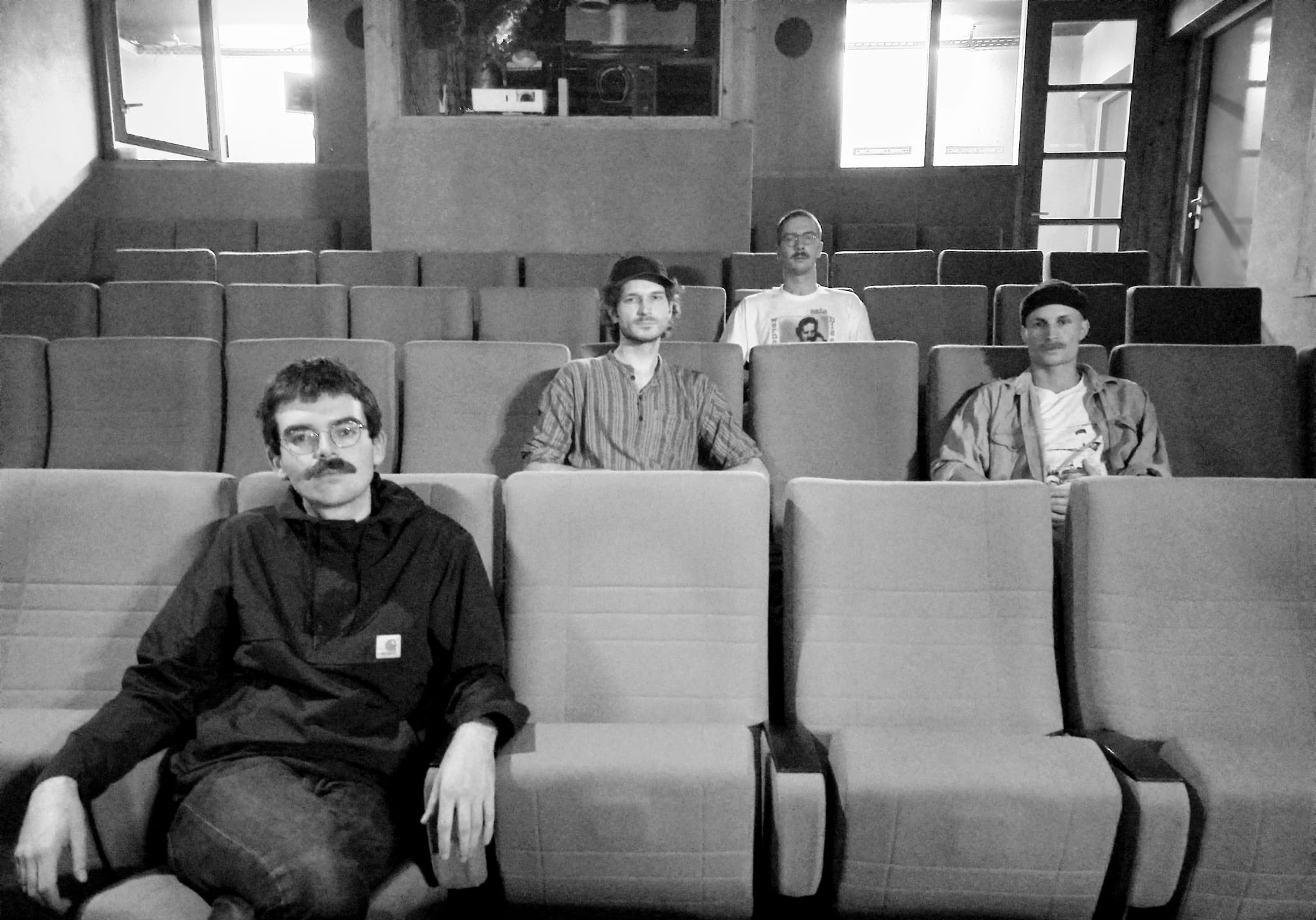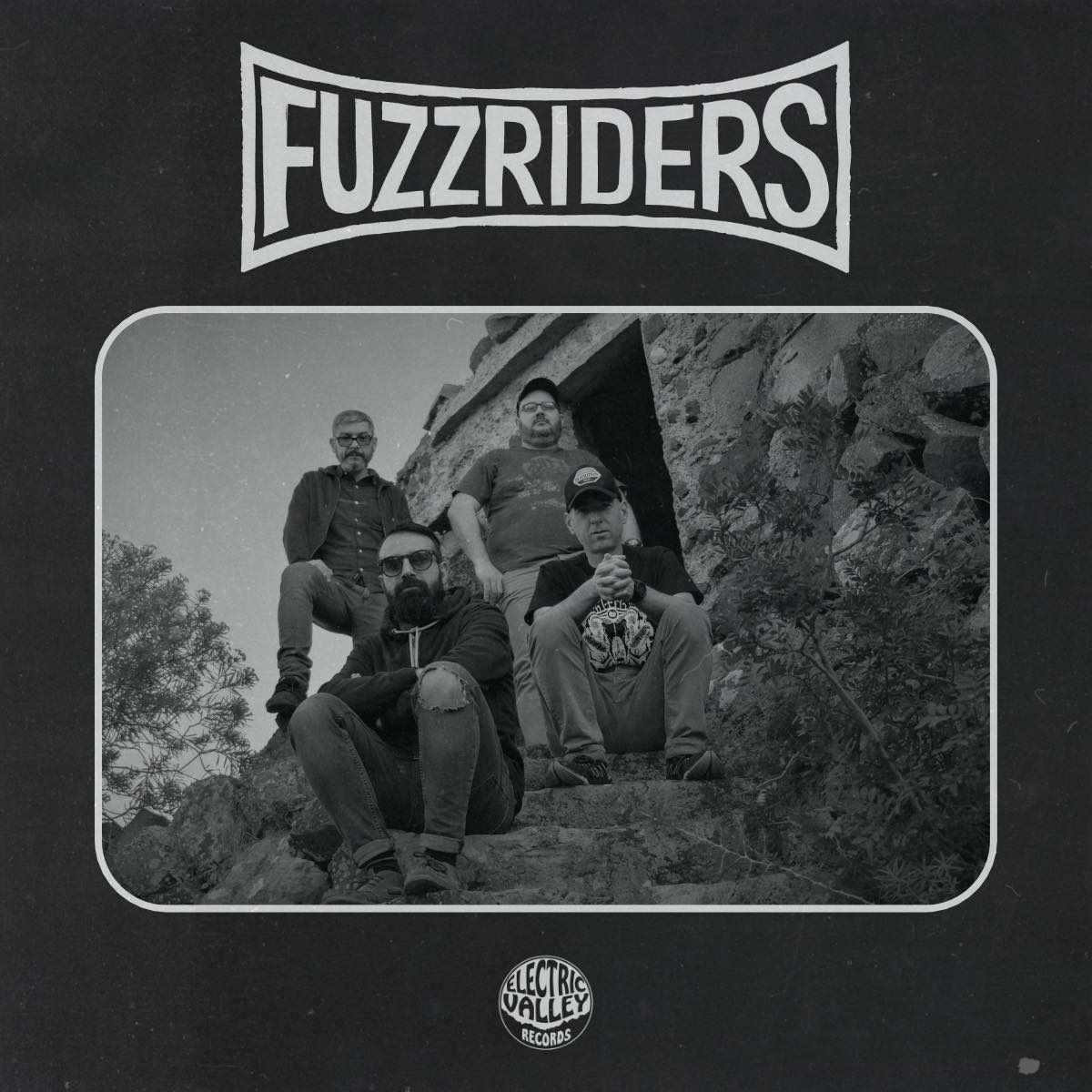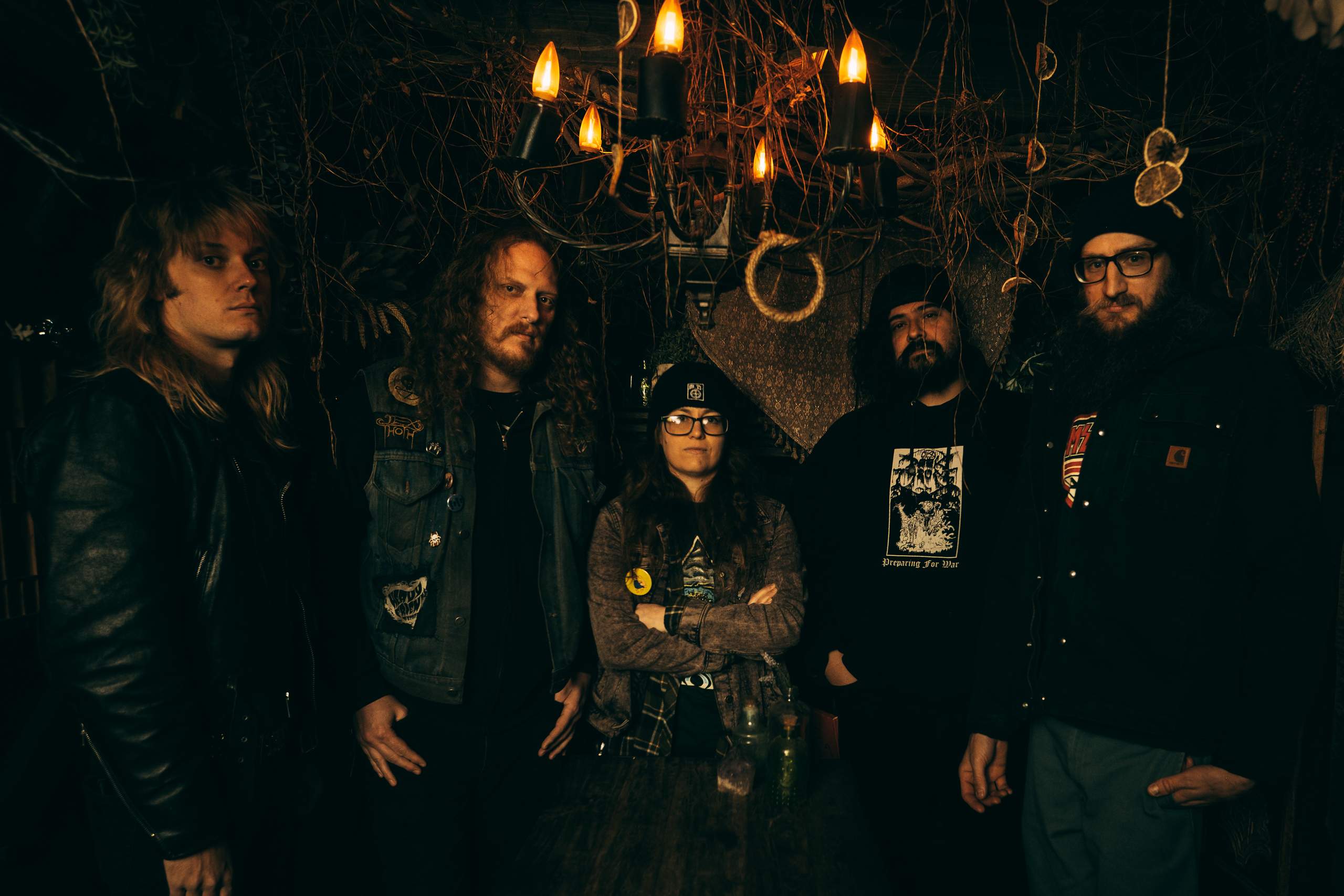Trigon | Interview | New Album, ‘Cosmic Kraut Jam’
Trigon is a seismic explosion of psych rock and their own ferocious “HeavyZenJazz.”
Rainer Lange’s guitar rips through the cosmos, all jagged edges and liquid chaos, while Stefan Lange’s bass throbs like a heartbeat, fierce and unrelenting. Rudi Metzler’s drums serve as the anchor, thrashing from primal blows to trance-like grooves. Live, they’re a force of nature – a sonic assault that feels like being caught in a storm of improvisation and energy. No vocals, just the primal, mind-bending clash of sound, pure and unstoppable.

“Those jams were pure “HeavyZenJazz” moments!”
Jerry Kranitz of Aural Innovations said your latest album sounds like a mix of Mahavishnu Orchestra and early Guru Guru. How do you feel about this comparison? Do you see any parallels between your music and those iconic acts, or are there other influences that you think resonate more with your sound?
Rainer Lange: I’m flattered by the comparison and think it really captures the essence of what we do, giving listeners who aren’t familiar with us a good idea of our sound. Both bands have been in my record collection for over 40 years. However, as a guitarist, I’ve been more influenced by Roman Bunka from Embryo, as well as Frank Zappa and Joe Satriani.
Stefan Lange: Being Rainer’s younger brother, I listened to his record collection a lot in my youth. He’s a bit more into blues, while I lean more towards progressive rock. My musical life began with Can, Embryo, and King Crimson (along with the other big five). Some musicians who have influenced me include Tony Levin, Bill Bruford, Steve Vai, Ron Thal, and many more. Honestly, I draw inspiration from almost everywhere.
You’ve coined the term “HeavyZenJazz” to describe your style. Can you dive deeper into what this means for you as a band?
Rainer: “HeavyZenJazz” means that we play with power and edge (Heavy), that the foundation of our music is improvisation (Jazz), and that for us, this process feels like a form of group meditation (Zen). We’ve always aimed for a distinctive, original sound. The common labels like prog, fusion, rock-jazz, power-space-kraut-jam-rock, and post-kraut never quite captured our identity. “HeavyZenJazz” feels like a more fitting descriptor. We hope it also intrigues listeners from different musical backgrounds to give us a chance.
Stefan: I want to expand on what jazz means to us. It’s not just improvisation. In our early years, we had no formal knowledge of music theory — we just played whatever sounded good to our ears. These days, I understand things like modal scales, but honestly, if I had known that theory back then, I probably wouldn’t have played some of the things I did. They would have seemed “wrong” by conventional standards, but that raw, uninhibited approach led to something unique. Ultimately, it all comes down to playing as a unit, like “one zen-connected brain,” and it has to rock.
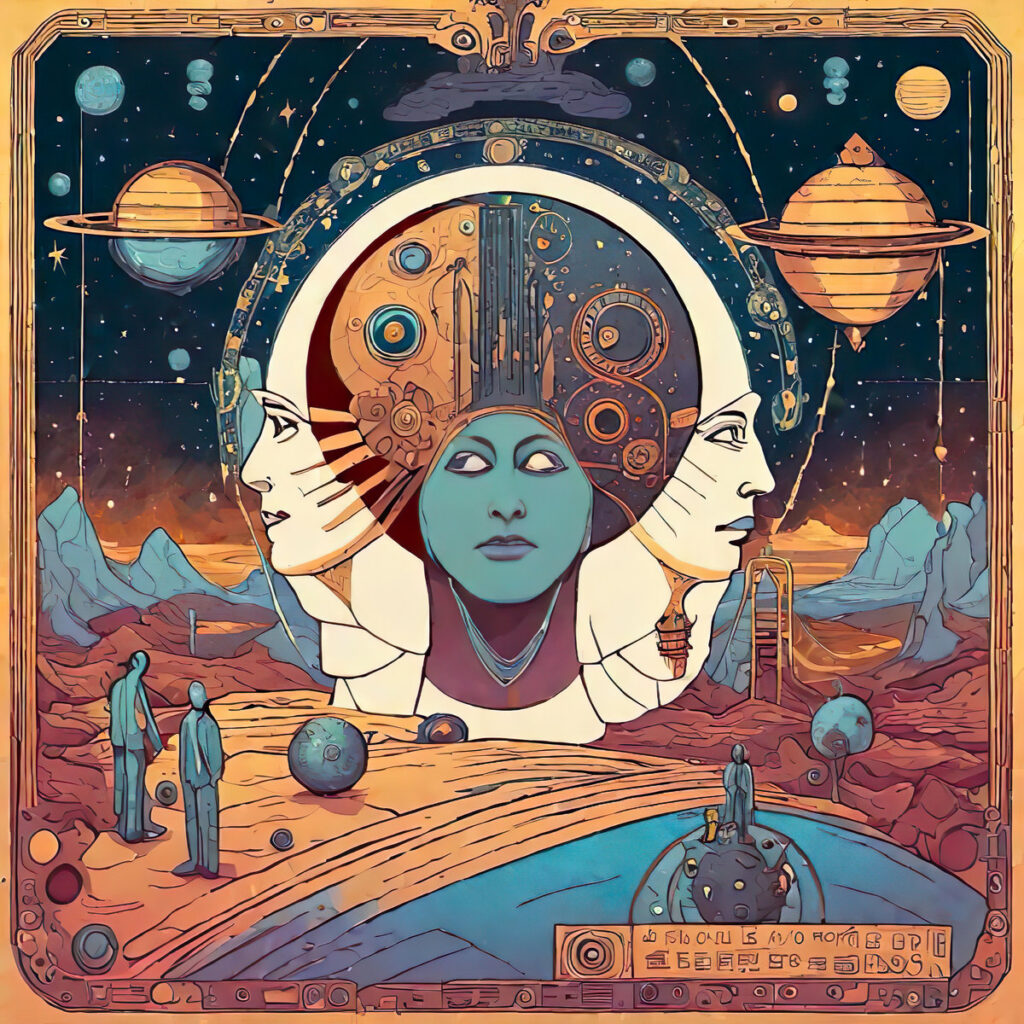
Can you tell us about your background — where you grew up, what inspired you to become a musician, etc.? Also, what led to the formation of Trigon? What would you say is the main concept behind it?
Rainer: With money from holiday jobs, I managed to buy my first equipment. Since our parents didn’t approve, I had to store everything at the youth center next door. That’s where I encountered a young Turkish band, and their scales and grooves have influenced my music to this day. My brother and I gave our first live concert with our first band in 1980. From that moment on, there was no turning back. Even then, we focused on original material, though about a quarter of our setlist consisted of covers (The Doors, Hendrix, ZZ Top…).
After repeatedly losing singers and discovering how much we enjoyed improvising, we decided to continue as a trio in 1989. At the time, our drummer was Ralf Wochele, who later joined Fool’s Garden. From 1989 until 2011, when Rudi (formerly of Poseidon) joined us, our songs were loosely and freely arranged. With Rudi Metzler on board, we put more emphasis on structured arrangements while still incorporating improvisation into every track. With our new LP, we’re essentially returning to our roots.
Stefan: I grew up with Rainer as my older brother (he’s 4.5 years older), so I was naturally exposed to his record collection, which had a big impact on me. Like Rainer, I also had my fair share of “parental disapproval” stories. Our musical journeys were pretty similar. From the beginning, I didn’t want to play other people’s songs, so I was happy when we ditched the covers. That said, about six years ago, I joined the Uriah Heep tribute band Circle of Hands (there’s a whole story behind that decision).
Playing Uriah Heep’s music felt completely different on my fretboard. It made me start paying attention to music theory, and I discovered some curious things about our “trigonal” music. Learning to play like Paul Newton, John Wetton, Garry Thain, and Trevor Bolder definitely left its mark on my style. But at the end of the day, I’m proud to have a sound that’s distinctly my own. I’m also honored to hear that my playing has influenced other bassists.
Were you involved with any other bands before forming Trigon?
Rainer: Stefan and I have always been the nucleus around which drummers and singers rotated.
Stefan: Exactly!
You’ve performed at an impressive array of festivals and shared stages with legendary acts like Nektar. How have these experiences shaped the evolution of your sound and approach to live performance?
Rainer: Not so much our sound or live performance, as we’ve always had clear, original ideas about those aspects. But, of course, we were guided onto the right path by our biggest influences when it came to professionalism. There was a lot to learn—understanding the different phases of a concert and how to craft a setlist, setting up on stage so we can hear each other properly (and the sound engineer has no issues), engaging the audience, and dealing with stage fright. From Roye (of Nektar), I learned to take my time.
Stefan: I didn’t just learn to take my time—I also learned when “more time” becomes “lost time.” A 45-minute soundcheck is just too long. You can add hours and hours, but it won’t necessarily get better.
The new LP has been mixed and mastered by Eroc. How did working with him influence the final sound of the album?
Rainer: Since 2005, starting with our CD ‘Emergent,’ we’ve worked exclusively with Eroc, who has essentially become the fourth member of the band. He has an incredibly sharp ear—not just for sound but for understanding what we’re trying to convey and what each part of a track should express. He identifies all the “scenes” within a piece, and on the first take, he often exaggerates certain elements. Then he sends me the draft, and I get a sense of his vision for the track. Most of the time, I agree with his approach, and he dials it back slightly. A track typically goes back and forth 3-4 times until everyone is satisfied, including Eroc. The rich details he brings out are best experienced on headphones.
Stefan: I have nothing to add. Eroc is the man!
With a career spanning since 1989 and the latest release of your first LP on vinyl, what does this milestone mean to you personally and as a band?
Rainer: We’re just as surprised! I’ve been collecting records for half a century, and I love vinyl. It feels completely different compared to taking a CD out of its case. Placing an LP on the turntable has a ritualistic quality. But making an LP is a lot more time-consuming and expensive than producing a CD—right down to shipping costs—which is why we hesitated for so long. We have to cover all the costs and handle everything ourselves. No one else takes on the risk. That said, we’re proud and satisfied. It turned out even more wonderful than we had hoped.
Stefan: When we got the test pressing, I was supposed to check it for technical mistakes, but I had a hard time concentrating. I was completely flashed hearing our music on the turntable. It felt surreal. The moment the needle softly touches the vinyl and those first sounds play… my brain was in heaven.
Can you share more about the album-making process and the songs on it?
Rainer: In our rehearsal space, every session starts with a jam. That’s always been our foundation. The concept for how I want to “package” a release—whether it should be more raw or fully arranged—changes and evolves over time. For this album, during three of our rehearsal sessions, we had these magical moments where everything just flowed naturally. Those moments became the core of this LP.
Stefan: Those jams were pure “HeavyZenJazz” moments!
If you could choose one track from the new LP that encapsulates the essence of Trigon and “HeavyZenJazz,” which would it be and why?
Rainer: Clearly, ‘Achtung Traumspoiler’—23 minutes of constant, flowing change. One of us will introduce a new idea, and the other two pick it up, with no one planning or overthinking. We just let ourselves be carried away by the process. I vividly remember the moment the session ended. We looked at each other, breathless and stunned, asking, “What was that? What just happened?” That feeling stuck with us, and we carried it into our subsequent jams. We’re truly grateful to have experienced that moment and to have captured it in a way we couldn’t have planned or even imagined.
Stefan: That’s right. Gratitude is probably the strongest feeling I have when I think about playing Trigon’s music. With Achtung Traumspoiler, I feel pure gratitude. For a bit of “quick fun,” I’d choose the 8-minute track ‘Guten Morgen Aurora.’ I love the break in the middle and how we build it back up afterward.
In the context of “HeavyZenJazz,” how do you balance the intricate, often esoteric nature of jazz with the heavier, more visceral elements of rock and prog?
Rainer: We don’t. It just happens. It’s what we feel and do.
Stefan: And we don’t care. It’s not that we play what fits the label we’ve chosen—it’s that we chose the label to describe what we do.

Let’s end this interview with some of your favorite albums and films. Have you found something new lately you’d like to recommend to our readers?
Rainer: Albums:
Roman Bunka – ‘Dein Kopf Ist Ein Schlafendes Auto’
Porcupine Tree – ‘In Absentia’
Frank Zappa – ‘Shut Up ‘n Play Yer Guitar’
Brand X – ‘Livestock’
ZZ Top – ‘Tres Hombres’
New Recommendation:
Check out Sex Magick Wizards—raw creative energy!
Films:
The Fifth Element
Serenity
Stefan:
Albums:
King Crimson – ‘Red’
Alamaailmaan Vasarat – ‘Käärmelautakunta’
Bohren & der Club of Gore – ‘Dolores’
Knorkator – ‘Sieg der Vernunft’
Opeth – ‘Ghost Reveries’
Films:
The Fifth Element
Rick & Morty (Yes, it counts!)
New Discovery:
Lately, I’ve been blown away by Adam Ben Ezra. I’ve had an electric double bass for a while now, but listening to him makes me feel like a total beginner. I don’t think I’ll ever come close to his league.
Klemen Breznikar
Trigon Official Website / Facebook / Bandcamp / YouTube

